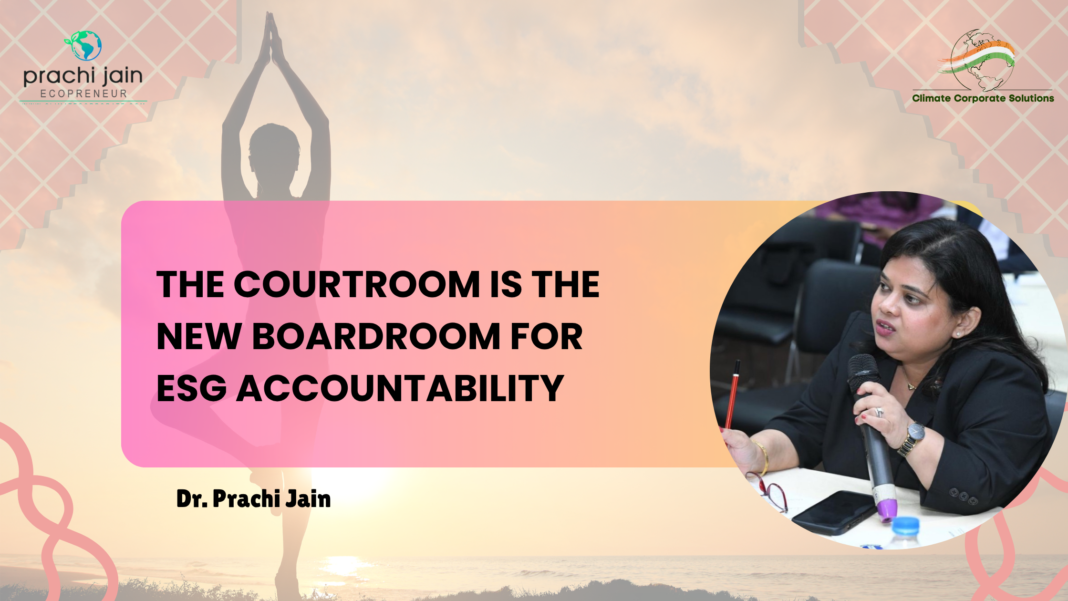The corporate world is witnessing a seismic shift—one where Environmental, Social, and Governance (ESG) principles are no longer relegated to glossy sustainability reports or optional boardroom discussions. Today, ESG has become a cornerstone for businesses in terms of legal, financial, and reputational considerations across the globe. As climate risks escalate and social demands intensify, legal systems are rapidly evolving to incorporate ESG within enforceable frameworks. What once began as a voluntary set of values is now a set of mandatory mandates with binding consequences.
The roots of ESG stretch back to the early 2000s, gaining momentum with the launch of the United Nations Principles for Responsible Investment (UNPRI) in 2006. ESG provides a holistic lens through which companies can assess long-term risks and opportunities across environmental stewardship, social responsibility, and governance structures. Unlike Corporate Social Responsibility (CSR), which often remains philanthropic, ESG is about integrating sustainability into the very DNA of decision-making. According to the Governance & Accountability Institute, 96% of S&P 500 companies published ESG reports in 2023, underscoring the widespread adoption of ESG not just as a moral obligation, but also as a strategic imperative.
However, the most profound transformation lies in the legalisation of ESG. Where once companies could choose whether and how to disclose sustainability data, they are now being compelled to do so by law. The European Union leads this charge with a robust regulatory framework that includes the Corporate Sustainability Reporting Directive (CSRD), the EU Taxonomy Regulation, and the upcoming Corporate Sustainability Due Diligence Directive (CSDDD). The CSRD alone requires over 50,000 EU companies to disclose ESG data using standardised metrics, thereby radically increasing transparency and comparability.
Across the Atlantic, the U.S. Securities and Exchange Commission (SEC) is pushing for mandatory climate risk disclosures. At the same time, India’s Securities and Exchange Board (SEBI) has introduced the Business Responsibility and Sustainability Reporting (BRSR) format for the top 1,000 listed companies. Even China, traditionally slow to enforce ESG compliance, introduced guidelines for listed companies in 2022, signalling its intent to catch up. Germany’s Supply Chain Due Diligence Act (Lieferkettengesetz), which came into effect in 2023, legally obliges companies to monitor environmental and human rights standards across their supply chains—highlighting how ESG is morphing into a matter of legal liability.
Breaking ESG down further reveals the interconnected legal layers. On the environmental front, compliance entails navigating laws related to emissions, waste, biodiversity, and energy use. The EU Emissions Trading System caps carbon output for companies, while the U.S. Clean Air Act regulates air pollutants. In India, the Environment Protection Act of 1986 remains a foundational law. A powerful example of legal accountability emerged in 2021, when a Dutch court ordered Shell to reduce its CO₂ emissions by 45% by 2030—an unprecedented ruling that underscored judicial recognition of corporate climate responsibility.
Social compliance, meanwhile, touches on labour rights, diversity, equity, and supply chain ethics. These are governed by international standards, such as ILO conventions, and national frameworks, including India’s POSH Act, Factories Act, and the Child Labour Prohibition Act. Countries like the UK and Australia enforce Modern Slavery Acts that require businesses to disclose efforts against forced labour. A historical case that transformed corporate ESG consciousness is Nike’s infamous labour scandal in the 1990s, which triggered widespread reform in supply chain governance and corporate transparency.
Governance, often overlooked, forms the backbone of effective ESG. It covers board composition, executive remuneration, audit committees, and anti-corruption practices. The Sarbanes-Oxley Act in the U.S. and India’s Companies Act (2013) mandate corporate governance standards including the appointment of independent directors and disclosure of conflicts of interest. Companies like Unilever and Apple now tie executive compensation to ESG performance. The Volkswagen emissions scandal (Dieselgate) serves as a grim reminder of how governance failures can erode brand equity and lead to legal action worldwide.
Enforcement agencies are becoming more proactive in ensuring ESG compliance. The SEC, for instance, has ramped up investigations into greenwashing and inaccurate ESG disclosures. In Europe, the Green Claims Directive seeks to penalise unsubstantiated environmental marketing. India’s SEBI has gone a step further by mandating ESG assurance—third-party verification of reported data under the BRSR Core framework. Internationally, bodies such as IOSCO, the UN Global Compact, and the OECD are coordinating efforts to establish cohesive ESG accountability across borders.
Non-compliance with ESG norms carries significant consequences. Legal penalties, stock delisting, reputational damage, and investor exits are just the beginning. In 2022, Deutsche Bank’s DWS Group came under investigation for misrepresenting ESG credentials, triggering probes by both the SEC and German authorities. ESG-focused investors, such as BlackRock and Vanguard, have increasingly divested from companies that fail to meet compliance expectations. A downgrade in ESG ratings by agencies such as MSCI, Sustainalytics, or S&P can result in restricted access to capital and declining share prices.
Globally, countries are treading different paths but converging in intent. The EU remains the gold standard for mandatory ESG disclosures and regulatory stringency. The U.S. is torn between federal mandates and state-level resistance. India is pioneering structured ESG disclosures through the BRSR while also enforcing CSR requirements under its Companies Act. China, although still in its early stages, is moving steadily toward ESG integration. Moreover, the rise in climate litigation—from the Urgenda v. Netherlands case to Leghari v. Pakistan—signals the judiciary’s growing role in enforcing ESG norms. The UN’s Business and Human Rights Framework is also pushing countries to create National Action Plans for corporate accountability.
Looking ahead, ESG compliance will be increasingly shaped by technology and legal accountability. Platforms like Workiva, Enablon, and Refinitiv are being adopted for real-time ESG data collection, reporting, and risk analysis. Artificial intelligence is being used to detect greenwashing and enhance audit trails. Blockchain technology promises to revolutionise ESG traceability across supply chains. Additionally, ESG assurance is fast becoming mandatory. India’s BRSR Core requires reasonable assurance from third-party auditors, and similar trends are emerging in Europe and North America.
Legal responsibility is extending to the boardroom. Directors and officers are being held accountable for ESG failures as part of their fiduciary duties. Jurisdictions like the UK and Canada are already moving in this direction. Legal scholars argue that ESG negligence should be treated as corporate negligence—a concept that may soon see widespread adoption.
In conclusion, ESG is no longer a matter of branding or optics—it is a binding legal and operational framework that defines how businesses must act in the 21st century. Regulatory scrutiny, investor expectations, and social pressures are converging to make ESG compliance a non-negotiable reality. As Pablo Isla, former CEO of Inditex, aptly put it, “Being sustainable is not a choice. It is the only way to operate in the 21st century.” In this new era, companies must embed ESG into their core governance strategies not just to comply, but to compete and thrive.



